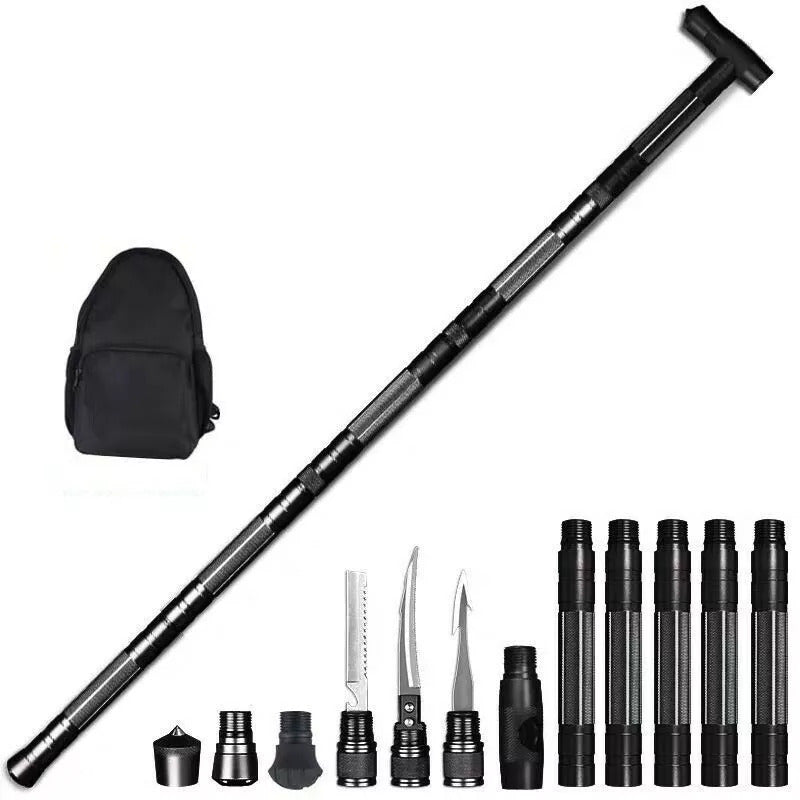
Ten Essentials When Hiking
Share
Hiking is a wonderful way to connect with nature, stay active, and explore new destinations. Whether you are a seasoned hiker or just starting out, it is essential to be prepared with the right gear to ensure a safe and enjoyable outdoor adventure. In this article, we will explore the top ten necessary items for hiking safely.
Navigation Tools: One of the most critical items for hiking is navigation tools such as a map, compass, and GPS device. These tools will help you stay on course, especially in unfamiliar terrain or if you encounter unexpected detours. It is important to learn map skills so you don't rely only on GPS.
First Aid Kit: Accidents can happen while hiking, so it is crucial to carry a well-stocked first aid kit. Include items like bandages, antiseptic wipes, pain relievers, and any personal medications you may need.
Water and Hydration System: Staying hydrated is key to a successful hike. Carry an ample supply of water or a hydration system like a hydration bladder or water bottle to prevent dehydration.
Nutrition: Pack lightweight, high-energy snacks like trail mix, energy bars, and fruits to keep your energy levels up during the hike. Proper nutrition is essential for sustained endurance.
Proper Footwear: Invest in a good pair of hiking boots or trail shoes that provide support and traction. Ill-fitting footwear can lead to blisters and discomfort, impacting your hike.
Weather-Appropriate Clothing: Check the weather forecast before heading out and dress in layers to stay comfortable. Carry a waterproof jacket, hat, and gloves in case of unexpected rain or temperature changes.
Emergency Shelter: Carry a lightweight emergency shelter such as a space blanket or bivvy sack in case you unexpectedly need to spend the night outdoors due to unforeseen circumstances.
Multi-Tool or Knife: A multi-tool or a sturdy knife can be invaluable for various tasks like cutting bandages, repairing gear, or preparing food. Choose a compact, high-quality tool for convenience.
Headlamp or Flashlight: Illuminate your path during early morning or late evening hikes with a reliable headlamp or flashlight. Don't forget to pack extra batteries for extended hikes.
Communication Device: In case of emergencies, carry a fully charged cell phone, a whistle, or a personal locator beacon (PLB) to signal for help if needed. Ensure you have a clear signal in your hiking location.
Conclusion: By being well-prepared with these essential items, you can significantly enhance your safety and enjoyment while hiking. Remember to also research your hiking trail, inform someone of your plans, and practice Leave No Trace principles to minimize your impact on the environment. Now, lace up your boots, pack your gear, and embark on your next hiking adventure with confidence!
Navigation Tools: One of the most critical items for hiking is navigation tools such as a map, compass, and GPS device. These tools will help you stay on course, especially in unfamiliar terrain or if you encounter unexpected detours. It is important to learn map skills so you don't rely only on GPS.
First Aid Kit: Accidents can happen while hiking, so it is crucial to carry a well-stocked first aid kit. Include items like bandages, antiseptic wipes, pain relievers, and any personal medications you may need.
Water and Hydration System: Staying hydrated is key to a successful hike. Carry an ample supply of water or a hydration system like a hydration bladder or water bottle to prevent dehydration.
Nutrition: Pack lightweight, high-energy snacks like trail mix, energy bars, and fruits to keep your energy levels up during the hike. Proper nutrition is essential for sustained endurance.
Proper Footwear: Invest in a good pair of hiking boots or trail shoes that provide support and traction. Ill-fitting footwear can lead to blisters and discomfort, impacting your hike.
Weather-Appropriate Clothing: Check the weather forecast before heading out and dress in layers to stay comfortable. Carry a waterproof jacket, hat, and gloves in case of unexpected rain or temperature changes.
Emergency Shelter: Carry a lightweight emergency shelter such as a space blanket or bivvy sack in case you unexpectedly need to spend the night outdoors due to unforeseen circumstances.
Multi-Tool or Knife: A multi-tool or a sturdy knife can be invaluable for various tasks like cutting bandages, repairing gear, or preparing food. Choose a compact, high-quality tool for convenience.
Headlamp or Flashlight: Illuminate your path during early morning or late evening hikes with a reliable headlamp or flashlight. Don't forget to pack extra batteries for extended hikes.
Communication Device: In case of emergencies, carry a fully charged cell phone, a whistle, or a personal locator beacon (PLB) to signal for help if needed. Ensure you have a clear signal in your hiking location.
Conclusion: By being well-prepared with these essential items, you can significantly enhance your safety and enjoyment while hiking. Remember to also research your hiking trail, inform someone of your plans, and practice Leave No Trace principles to minimize your impact on the environment. Now, lace up your boots, pack your gear, and embark on your next hiking adventure with confidence!
